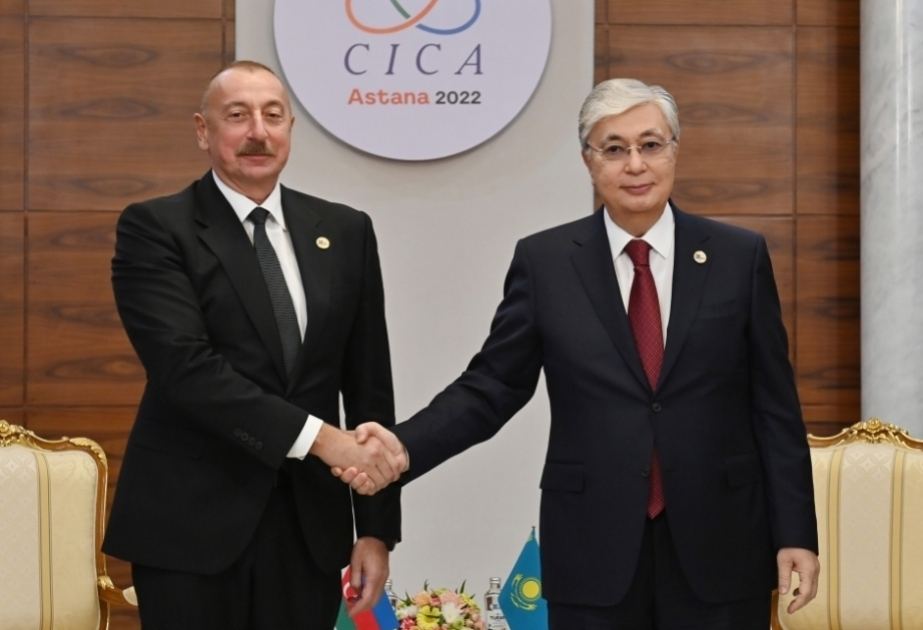BAKU, Azerbaijan, April 10. As the global situation remains uncertain, and confrontational in many aspects, relationship between Azerbaijan and Kazakhstan has always enjoyed a high level of stability. The strategic partnership between Baku and Astana was always of high importance to both nations, due to the approach based on the principles of political liberalism jointly shared by the nations.
Changing geopolitical landscapes, new opportunities, and challenges are going to shape the policies aimed at fostering cooperation between the nations in several fields.
In the context of discussing the level of bilateral relations and cooperation between Kazakhstan and Azerbaijan, it is important to mention that every area of cooperation constitutes strategic importance. Azerbaijan and Kazakhstan are two countries that, despite their differentiating characteristics, are in similar situations and share similar foreign policy goals.
There are several directions, which are of the main focus of the bilateral agenda of the two countries.
Energy, transport, trade - three elements of the puzzle
Continuing cooperation in the energy and transport sectors is, currently, the key element defining the future long-term model of economic partnership between Azerbaijan and Kazakhstan.
The economies of both nations are highly dependent on hydrocarbons exports, despite the gradual shift to other modes of generating energy.
Kazakhstan has already availed itself of the opportunities offered by Azerbaijani energy infrastructure by exporting some of its oil via the Baku-Tbilisi-Ceyhan (BTC) pipeline. The deal signed between SOCAR and KazMunayGas, the national oil companies of Azerbaijan and Kazakhstan, entails the annual transit of 1.5 million tons of oil via the BTC. In April alone, KazMunayGas intends to transit 125,000 tons of oil via Azerbaijan. Although the volume of oil expected to be transited via Azerbaijan is impressive, considering the early stages of such cooperation and the possible challenges associated with the implementation of a major project, Azerbaijan can transit more, and it is in the best interests of Kazakhstan to increase transit via this route. This stems from the obvious benefits to be had by both parties. From the perspective of Azerbaijan, ensuring the safe transit of Kazakh oil will generate tangible and intangible resources. Meanwhile, looking at the transit through the lens of Astana reveals that transiting oil via the BTC will help Kazakhstan, should unforeseen technical challenges arise on other routes due to several possible reasons.
Then, there is also “green energy”. Both Azerbaijan and Kazakhstan initiated a shift in their energy policy doctrines, which will ascend the countries to the status of energy exporting states, rather than mere hydrocarbons exporters. The fact that green energy became an important element in the agenda of Baku and Astana makes it easier for the nations to establish long-term cooperation in the field.
The key takeaway here is that the energy cooperation between Baku and Astana continues and has a high growth cap.
Energy cooperation is only one part of the complete picture because energy cooperation is impossible to implement without the proper support of the transport sector. For Baku and Astana, the development of transport cooperation is a strategic necessity, considering the modern geopolitical realities. The Trans-Caspian International Transport Route (TITR), also known as the Middle Corridor, becomes the cornerstone of international trade, which creates challenges and opportunities for both nations. The opportunities are obvious, as participation in this project enables Baku and Astana to increase their economic potential, in addition to giving both countries the possibility to further their political influence.
In the framework of the Middle Corridor, it is important to mention that the project is of global importance. As trade routes through Russia and Iran remain restricted, Azerbaijan and Kazakhstan offer a safe passage of goods between the West and the East. Consequently, there is much interest in the successful implementation of the project from the decision-makers in the US, the EU, and the Gulf States as well. The key element here is that Azerbaijan and Kazakhstan need to ensure that the capacity of transport sectors in both states is sufficient to guarantee the transit of the increasing volume of goods. This objective can be achieved by improving infrastructure and by harmonizing the legislative foundation guiding the process.
It is not a secret that decision-makers in Azerbaijan and Kazakhstan consider that there is significant potential to develop trade between the nations. While the process was in full swing, COVID-19 induced restrictions have dealt a major blow to trade turnover between Baku and Astana. Trade turnover improved after most restrictions were eliminated, however, it remains relatively small with roughly $500 million, according to Kazakh estimates. Considering the sizes of Azeri and Kazakh markets, the mutual importance of the nations, and the policies aimed to boost trade, this result can be improved significantly.
A new boost to bilateral relations
Azerbaijan and Kazakhstan laid a strong foundation for building long-term relationships many years ago, which enables the countries to continue in the same vein moving to the future. Despite the obstacles, challenges, and other opportunities available, Azerbaijan and Kazakhstan remained close partners, and the status of the partnership only increased. Albeit all the progress, there is still significant untapped potential to be explored by the countries in the future. When looking at the past relationship dynamics, it becomes safe to suggest that Azerbaijan and Kazakhstan will continue the trend of cooperation, and the foundation for the future transformation is already there.







